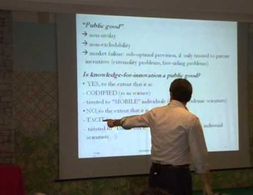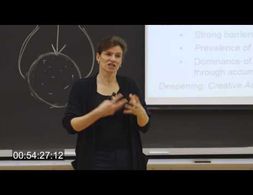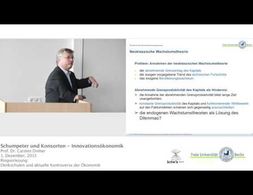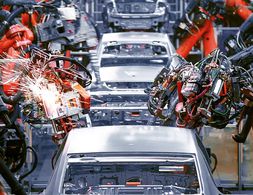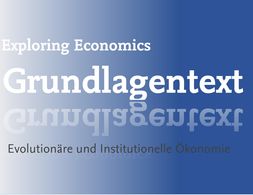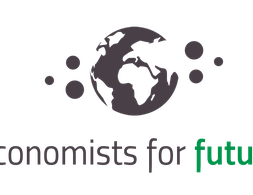124 Ergebnisse
The Lecturer Prof. Francesco Lissoni presents basic concepts of the Economics of Innovation. Firstly, he distinguishes between invention, innovation and diffusion and relates innovation to economic growth. Subsequently, he elucidates learning and network effects.
What is innovation, what drives innovation and the process that differentiates firms? What is competition and what kind of dynamics lie behind the differences between firms and their innovative activities? Mariana Mazzucato elaborates on those questions from an evolutionary economics' and Schumpeterian perspective. The slides of her lecture are not visible, hence some visualizations can't be followed.
The article discusses the state’s influence on innovation through financial support and provides examples how the state could receive a financial share of successful enterprises in order to keep on driving innovation in the future.
The Commentary explains the circular value chain and innovation potential along it. Focusing on Israel, examples on how cross-industry collaboration can help supporting a successful positioning in a (Digital) Circular Economy are presented.
The Learning Economy and the Economics of Hope' brings together the most important contributions by an expert on policies, management and economics of innovation and knowledge. It offers original insights in processes of innovation and learning and it draws implications for economic theory and public policy. It introduces the reader to important concepts such as innovation systems and the learning economy.
Evolutionary economics focuses on economic change. Hence processes of change such as growth, innovation, structural and technological change, as well as economic development in general are analysed. Evolutionary economics often gives emphasis to populations and (sub-)systems.
This study offers a unique evolutionary economics perspective on energy and innovation policies in the wider context of the transition to sustainable development. The authors include: - an analysis of the environmental policy implications of evolutionary economics - a critical examination of current Dutch environmental and innovation policies and policy documents - systematic evaluation of three specific energy technologies, namely fuel cells, nuclear fusion and photovoltaic cells, within the evolutionary-economic framework.
This course will introduce key concepts, theories and methods from socioeconomics. The first part of the course, will deal with the main economic actors and how their interactions are governed. Markets are seen as sets of social institutions. Institutions shape how consumers, firms and other economic actors behave. While it is difficult to understand how novelty emerges, we can study the conditions that are conducive to innovation. We will review how economic performance, social progress and human wellbeing are measured and what progress has been made. In the second part of the course, we will study a specific macroeconomic model that accounts for biophysical boundaries and inequality.
In this Ted Talk, Mariana Mazzucato argues against the juxtaposition of the state and entrepreneurial activities. By presenting examples of her research on the relation between innovation and (inclusive) growth, she shows how many innovations were led by states' initiatives. Mazzucato confronts the liberal narrative of the a state that merely provides the frame for the market.
Carsten Dreher starts with a historical perspective on the development of evolutionary economics by mentioning the difficulties of neoclassical economics to explain economic growth and by referring to the work of Joseph Schumpeter. Then some concepts such as business cycles, path dependencies are shortly explained. Dreher continues by introducing two different approaches in evolutionary economics, a micro centred approach that is associated with Nelson and Winter's work and a macro institutional and historical approach that has been pursued amongst others by Chris Freeman. Lastly the policy implications of treating economies as innovation systems are discussed and a summary of the differences of neoclassical and evolutionary economics is provided.
UBC's Henry Siu, a professor at the Vancouver School of Economics, speaks about innovation in economics, technological progress and what it means for the fut...
One of the pluralist theories which has gained prominence following the 2008 financial crisis is Hyman Minsky and his Financial Instability Hypothesis (FIH). Minsky was unique in viewing balance sheets and financial flows as the primary components of capitalist economies, and his focus on the financial system meant he was well-equipped for foresee a crisis much like 2008. Although he died long before 2008 his framework anticipated many of the processes which led to the crash, particularly increased risk-taking and financial innovation which would outstrip the abilities of regulators and central banks to manage the system.
Economic development is a process of continuous technological innovation and structural transformation. Development thinking is inherently tied to the quest for sustainable growth strategies. This book provides a neoclassical approach for studying the determinants of economic structure and its transformation and draws new insights for development policy.
Uncertain Futures considers how economic actors visualize the future and decide how to act in conditions of radical uncertainty. It starts from the premise that dynamic capitalist economies are characterized by relentless innovation and novelty and hence exhibit an indeterminacy that cannot be reduced to measurable risk.
Die Vorstellung, Ungewissheit durch Wissenschaft und Planung in Gewissheit transformieren zu können, wird zunehmend brüchig und zum Hemmnis für Innovation. Doch wie ist es möglich, Handlungsfähigkeit auch unter Bedingungen von Ungewissheit aufrechtzuerhalten oder gar weiterzuentwickeln? In diesem Buch werden neue Ansätze zur Bewältigung und Nutzung von Ungewissheit vorgestellt.
Die Evolutionäre und Institutionelle Ökonomie ist ein ökonomisches Paradigma, in welchem sozialer und ökonomischer Wandel eine zentrale Bedeutung einnehmen. In dieser heterodoxen Rolle außerhalb des wirtschaftswissenschaftlichen Mainstreams sehen einige die Evolutionsökonomie als eine Teildisziplin der Wirtschaftswissenschaften, die sich mit dynamischen Aspekten wirtschaftlichen Austausches befasst; für andere stellt sie eine Revolution wirtschaftstheoretischen Denkens dar. (vgl. Berendt/Glückler: 13 f.) Die Institutionelle Ökonomie zeigt Erklärungsansätze für wirtschaftliche Prozesse auf und betont, dass diese nicht ausschließlich durch „individuelles Rationalverhalten“ geprägt werden. Die Notwendigkeit von Institutionen wird betont, da ein individuelles, rationales Verhalten zu einer negativen Beeinflussung der Gemeinschaft führen kann und somit die Lösung über Institutionen erfolgen muss. (vgl. Nee, 2005: 49 ff)
In this essay the author elaborates on the EU's perspective on the fast growing sector of the platform economy.
This text provides an easy to understand introduction to complexity economics for non-specialist audiences such as bachelor's students.
Complexity economics focuses on interactions and interdependencies between individuals and structures in economic systems. Those are systems of organised complexity. High importance is given to the analysis of networks.
Der Fokus der Komplexitätsökonomik liegt auf den Interaktionen und Wechselwirkungen zwischen Individuen und Strukturen wirtschaftlicher Systeme. Diese werden als Systeme organisierter Komplexität aufgefasst. Ein besonderes Augenmerk liegt auf der Analyse von Netzwerken.
Der Fokus der Evolutorischen Ökonomik liegt auf der Erklärung wirtschaftlichen Wandels. Analysiert werden Wandlungsprozesse, wie Wirtschaftswachstum, Innovationen, Strukturwandel, technologischen Wandel, institutionellen Wandel oder allgemein die wirtschaftliche Entwicklung.
In this overview paper, Laura Porak reviews the history of industrial policy in the European Union before the background of a Cultural Political Economy approach.
Institutional economics focuses on the role of social institutions in terms of laws or contracts, but also those of social norms and patterns of human behaviour that are connected to the social organisation of production, distribution and consumption in the economy.
What made the false assumption that saving the economy at all cost during a pandemic so popular? This paper discusses different pathways through the COVID-19 pandemic at national and international level, and their consequences on the health of citizens and their economies.
An essay of the writing workshop on contemporary issues in the field of Nigerian economics: The adverse effect of climate change is overwhelming, not just in Nigeria but globally. Global warming is the result of hostile human activities that have impacted the environment negatively. This is the principal variable the government should tackle through practical innovations such as the acceptable implementation of Adaptation Policies and also through the adequate implementation of environmental tax. These will enhance pro-environmental behaviour which is fit for socio-political and economic activities for sustainability.
Die scheinbare Eindeutigkeit der wirtschaftswissenschaftlichen Analyse von Maßnahmen gaukelt eine Berechenbarkeit vor, die nichts mit der Realität zu tun hat. Vielmehr braucht es gerade in der Klimapolitik einen Ansatz, der flexibel reagieren kann und gleichzeitig die Entwicklung neuer innovativer Lösungen befördert: das sogenannte agile Politikdesign.
This paper is a product of an online workshop held in Nigeria on the topic Unemployment: Policy Review and Recommendations. It explores the various unemployment policies introduced by the Nigerian Government and analysis how effective they are and suggests some practicable solutions to solving unemployment problems in the country.
The workshop was organized by Rethinking Economics The Uploaders (RETU) as part of the project Solving the Major Economic Problem in Nigeria (SMEPN), an output of the Global Pluralist Economics Training (GPET).
More details here: https://www.retheuploaders.org/programs/SMEPN
Recovery from the Covid-19 crisis provides a chance to implement economic measures that are also beneficial from environmental and social perspectives. While ‘green’ recovery packages are crucial to support economies tracking a low-carbon transition in the short-term, green measures such as carbon pricing are also key to improving welfare in the long-term. This commentary specifies the need for carbon pricing, outlines its implications for our everyday lives, and explains how it works alongside value-based change in the context of climate action and societal well-being.
The Microeconomics of Complex Economies uses game theory, modeling approaches, formal techniques, and computer simulations to teach useful, accessible approaches to real modern economies.
Austrian economics focuses on the economic coordination of individuals in a market economy. Austrian economics emphasises individualism, subjectivism, laissez-faire politics, uncertainty and the role of the entrepreneur, amongst others.
Der Fokus der Österreichischen Schule liegt auf der wirtschaftlichen Koordination von Angebots- und Nachfrageplänen zwischen Individuen. Konstitutiv sind u.a. der Subjektivismus, das Nutzenprinzip, Laissez-faire-Politik, fundamentale Unsicherheit sowie der Fokus auf den/die Unternehmer*in.
Innovationspolitik ist relevant für eine klimabewusstere Zukunft – und ihre Relevanz geht über die generelle Förderung allgemein umweltbewusster Innovationen hinaus.
Wir nutzen Cookies. Klicke auf "Akzeptieren" um uns dabei zu helfen, Exploring Economics immer besser zu machen!

